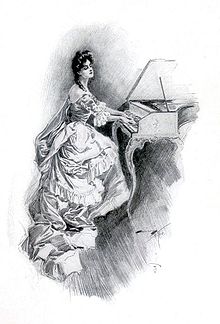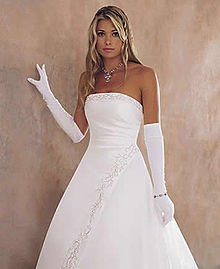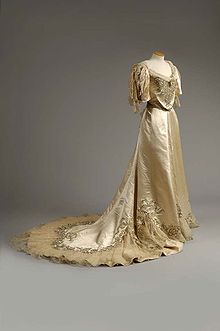- Débutante
-
The title of this article contains the character é. Where it is unavailable or not desired, the name may be represented as Debutante.
A débutante (from the French débutante, "female beginner") is a young lady from an aristocratic or upper class family who has reached the age of maturity, and as a new adult, is introduced to society at a formal "début" presentation. It should not be confused with a Debs. Originally, it meant the young woman was eligible to marry, and part of the purpose was to display her to eligible bachelors and their families with a view to marriage within a select upper class circle. Débutantes may be recommended by a distinguished committee or sponsored by an established member of elite society. In the Southern United States, débutantes are also referred to as Southern belles[citation needed]. The male equivalent of a débutante is a "beau".
Début presentations vary by regional culture and are also frequently referenced as "débutante balls," "cotillion balls" or "coming-out" parties. The male equivalent is often referred to as "beautillion ball". A lone débutante might have her own début, or she might share it with a sister or other close relative. Modern débutante balls are often charity events: the parents of the débutante donate a certain amount of money to the designated cause, and the invited guests pay for their tickets. These balls may be elaborate formal affairs and involve not only "debs" but junior débutantes, escorts and ushers, flower girls and pages as well.
Contents
Australia
In Australia, débutante balls (or colloquially "deb balls") are held in year 11 or 12 for students of Australian schools or are held outside the school system by organisations such as the local chapter of Lions Club, RSL sub-branches or a local church parish. Girls do not have to 'make their deb' and today the vast majority of Australian girls elect not to attend débutante balls. The term 'debutante ball' is in fact not known by the majority of Australians, for this reason the very concept of debutante balls is considered a dying, almost obsolete right of passage in Australia. Now, the tradition of the débutante ball is primarily seen as rite of passage, only for girls of the elite upper class in Australia.
Many Australian schools have a "formal", similar to the American prom. The formal, like a débutante ball, consists of dancing, however not formal ballroom. The formal has taken over much of the need for a "deb ball".
It is customary for the female to ask a male to the débutante ball, with males not being able to "do the deb" unless they are asked. Débutante ball students who are partaking in the official proceedings must learn how to ballroom dance. Débutante balls are almost always held in a reception centre or ballroom. Usually they are held late in the year and consist of dinner, dancing and speeches. Schools often restrict invitations to the débutante ball to students within the grade level at one school, but single-sex schools tend to allow a partner with no association to the school to attend. They are often, but not always, similar to American proms.[1] The girl wears a white wedding dress-like ball gown, called a débutante dress, while the boy wears a tuxedo.
If a girl does not attend a private school, the girl may be invited to take part with her family to pay for the ball.
United Kingdom
In the United Kingdom, the presentation of débutantes to the Sovereign at court marked the start of the British social season. Applications for young girls to be presented at court were required to be made by ladies who themselves had been presented to the Sovereign which may have been their mother or someone else known by the family who themselves were eligible to vouch for the lady being presented. A mother-in-law who herself has been presented might, for example, present her new daughter-in-law. The Presentation of debutantes at court was also a way for young girls of marriageable age to be presented to suitable bachelors and their families in the hopes of finding a suitable husband. The bachelor in turn would use the court presentation as a chance to find a suitable wife. Those who wanted to be presented at court were required to apply for permission to do so by which if the application was accepted, they would be sent a royal summons from the Lord Chamberlain to attend the Presentation on a certain day which stated by Debretts always started at 10pm. As well as débutantes, older women and married women who had not previously been presented could be presented at Court.
On the day of the court presentation, the débutante and her mother or other eligible lady would be announced, the debutante would curtsy to the Sovereign and then leave without turning her back.
The court dress would have traditionally been a white evening dress, the colour white represented a young girl's virginity and purity but shades of ivory and pink were acceptable. The white dress would have consisted of short sleeves and white gloves and a train which would have been held in the debutantes arm until ready to be presented and a veil attached to the hair with three white ostrich feathers. Débutantes would also wear pearls but many would also wear jewellery that belonged to the family.
After the débutantes had been presented to the reigning monarch, they would then attend the social season as a means of being launched into society as a young lady which would have consisted of Royal Ascot, afternoon tea parties, polo matches and balls, all of which the young girls being presented would have been expected to attend and act in a manner befitting of a lady. Many débutantes would also have their own "coming-out party" or, alternatively, a party shared with a sister or other member of family.
The last débutantes were presented at Court in 1958 after Queen Elizabeth II abolished the ceremony. Attempts were made to keep the tradition going by organising a series of parties for young girls who might otherwise have been presented at Court in their first season (to which suitable young men were also invited). However, the withdrawal of royal patronage made these occasions increasingly insignificant, and scarcely distinguishable from any other part of the social season.
However, the expression "débutante" or "deb" for short continues to be used, especially in the press, to refer to young girls of marriageable age who participate in a semi-public upper class social scene. The expression "deb's delight" is applied to good looking unmarried young men from similar backgrounds.
United States
American débutante balls
A cotillion or débutante ball in the United States is a formal presentation of young ladies, débutantes, to "polite society". Débutantes are usually recommended by a distinguished committee or sponsored by an established member of élite society. Wearing white gowns and satin or kid gloves, the débutantes stand in a receiving line, and then are introduced individually to the audience. The débutante is announced and then is walked around the stage, guided by her father who then presents her. Her younger male escort then joins her and escorts her away. Each débutante brings at least one escort, sometimes two. Many débutante balls select escorts and then pair them with the debs to promote good social pairings. Cotillions may be elaborate formal affairs and involve not only "debs" but junior débutantes, escorts and ushers, flower girls and pages as well. Every débutante must perform a curtsy also known as the St. James Bow or a full court bow. This gesture is made as the young woman is formally presented. Débutante balls exist in nearly every major city in the United States but are more common and a larger affair in the South. Many cities such as Dallas and Atlanta have multiple balls in a season. Dallas, for example, is home of the traditional Idlewild organization, as well as more modern organizations such as The Dallas Symphony Orchestra Presentation Ball and La Fiesta de las Seis Banderas, both of which benefit charities. In New Orleans, Louisiana, a débutante is usually presented during the Carnival season. In New York City there are still several deb balls. One that draws from all over the world is the International Debutante Ball. Also there are other charity and social balls such as the Infirmary (benefits the local hospital), the Mayflower and the Saint Nicholas Ball. As an alternative to a ball, and more commonly in the old North, a young woman might have her own "coming-out party," given by her parents.[2] Unlike a collective ball, which would be only held at a certain time of the year, such a party could be at any time of the year, but might well be scheduled around the débutante's birthday. In theory, the only women who could be invited would be those who had already made their débuts, thus affording a sort of rank-order to the débutante season. These "old-money" families of the South also often send their preteen sons and daughters to dancing classes, called cotillion. When these girls are twenty-one they have a deb ball.
Débutante balls in U.S. television and films
Several television series focused on young people from wealthy families include episodes with débutante events. "The Debut," an episode of The O.C. (a drama about upper class Californians), featured a representation of an American débutante ball. "Hi, Society," (season 1 episode 10), and "They Shoot Humphreys, Don't They?," (season 3 episode 9) of Gossip Girl, also from The O.C. creator Josh Schwartz, features a débutante ball in New York City. "Presenting Lorelai Gilmore", an episode of Gilmore Girls shows Rory Gilmore as a débutante. She makes her debut at a Daughters of the American Revolution (DAR) débutante ball that her grandmother helped put together. In The Critic, Jay Sherman's younger sister Margo is persuaded to reluctantly attend her débutante ball.
Crime dramas also have investigated début-related murders. "Zoo York," an episode of CSI: NY, featured the CSI team investigating the murder of a débutante. Medical examiner Evan Zao comments that he attended a débutante ball. "Debut", an episode of Cold Case, tells the story of a young girl who is murdered the night of her débutante ball. In an episode of Law and Order: SVU, entitled Streetwise, detectives investigated the rape and murder of a débutante.
Films with débutante themes include Metropolitan, Whit Stillman's début feature film, a comedy of manners set during the deb season in Manhattan, and What a Girl Wants, a 2003 film in which Amanda Bynes plays an American teen whose estranged father is a British Lord, and who is presented at a coming out party after being reunited with her mother. In another movie featuring Amanda Bynes, She's The Man, the main character attends a debutantes preparation program throughout the movie which ends with the Debutante's ball. Something New, a romantic comedy has a cotillion scene of upper class African Americans on the west coast. The Debut, a film considered to be an accurate snapshot of contemporary Filipino American life, touches upon a wide variety of cultural themes within the plot of an informal débutante event. The 1992 film The Addams Family is centered around the reconciliation of Gomez and Fester Addams, who had had a falling out as teenagers when Gomez had wooed both his date and Fester's (Flora and Fauna Amore, the siamese twins) at the débutante ball. In the 1994 film Little Women, a 'coming-out' party is thrown, Aunt March is also seen talking to Marmee about when Meg will be introduced into society.
In the premiere of The City, Whitney Port's reality show, her co-worker Olivia Palermo describes her first pair of Manolo Blahnik shoes that she wore to her "Deb" back when she was 18 years of age.
In the Disney Channel, made-for-TV movie, Cow Belles, starring Aly & AJ, one of their characters gets kicked out of the ball for not having enough money.
Philippines
Cotillions and débutante balls (commonly known as "débuts") are very popular in the Philippines and in Filipino communities overseas. Eighteen candles are then presented to the débutante by eighteen of her closest girlfriends, and then eighteen roses are presented by eighteen male escorts. Traditionally, the débutante leaves the ball at midnight. The débutante tradition in Philippine culture is portrayed in the film The Debut.
Latin America
In Mexico, Puerto Rico, Panama and Paraguay, the débutantes are those young girls, typically fifteen or sixteen years old and belonging to middle-high and high class, that participate in a Festival de Debutantes or simply Debut, designed to officially present them to social life.
In Brazil, such events are called Baile de Debutante (débutante ball) or Festa de Quinze Anos (15 year party).
See also
Notes
- ^ http://www.dsansw.org.au/events/DebutanteBall2000.html[dead link]
- ^ However, in the case of Helen Barney, the term "débutante ball" was applied to the "coming-out party" given her by her uncle, William Collins Whitney, at his home at 871 Fifth Avenue in New York City on January 5, 1901. Cleveland Amory, Who Killed Society?, pp. 502-503. New York: Harper & Brothers, 1960.
External links
Categories:- British culture
- Philippine culture
- Women by social class
- Terms for females
- French words and phrases
- Culture of the Southern United States
- French culture
- Latin American culture
- Australian culture
- Beginners and newcomers
Wikimedia Foundation. 2010.



